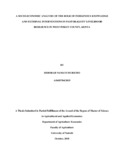A Socio-economic Analysis of the Role of Indigenous Knowledge and External Interventions in Pastoralists’ Livelihood Resilience in West Pokot County, Kenya

View/
Date
2018Author
Muricho, Deborah N
Type
ThesisLanguage
enMetadata
Show full item recordAbstract
Pastoralists face many shocks, which increase their vulnerability to food insecurity and poverty. In West Pokot county of Kenya, such shocks include prolonged seasons of drought that leads to acute shortage of forage resulting to fluctuations in milk and meat production and ultimately loss of livestock. The surging population growth forces human encroachment into shared grazing grounds leading to diminishing pasture availability. To counter these effects, pastoralists have been known to use their own indigenous knowledge which for a long time has enabled them to thrive in the harsh environment. Also, in recent years the county government of West Pokot together with other development partners has put in place interventionist programmes aimed at building pastoralists’ livelihood resilience. However, the extent to which these efforts contribute to resilience has not been comprehensively documented. This study assessed the effect of pastoralists’ own indigenous knowledge and the external interventions on household resilience to shocks. Primary survey data was collected through a combination of methods comprising a focus group discussion, key informant interviews and a household survey on 191 households. The Principal Component Analysis (PCA) method was used to compute household resilience index to shocks. An ordered probit regression model with 3 resilience categories was used to analyze the effect of indigenous knowledge and external interventions on household resilience. Results showed that most respondents derived over 75% of their food and income needs from livestock. Drought and livestock diseases were the most prevalent shocks. The average resilience index was 0.41. Regression results showed that indigenous practices such as ethno-veterinary practices and grazing on postharvest crop residues as well as external intervention programmes such as enclosing land, bee keeping, stocking improved breeds and institutional support in form of credit and extension services had a positive and significant effect on building household resilience to shocks. These results suggest the need to incorporate the indigenous practices in the external interventions together with more institutional support to help pastoralists overcome shocks.
Publisher
University of Nairobi
Rights
Attribution-NonCommercial-NoDerivs 3.0 United StatesUsage Rights
http://creativecommons.org/licenses/by-nc-nd/3.0/us/Collections
The following license files are associated with this item:

